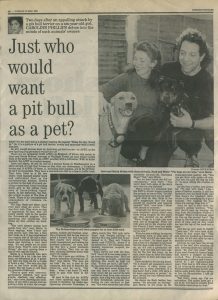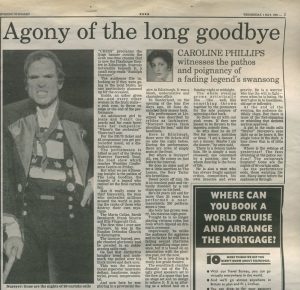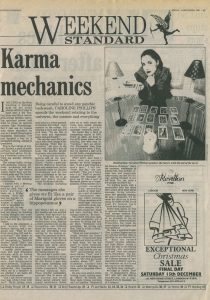The soviet space chief last night launched an extraordinary attack on women astronauts-including orbiting Briton Helen Sharman, whom he described as a loner who ‘works like an iron lady’. CAROLINE PHILIPS talked to the parents of the down-to-earth girl.
WHEN Helen Sharman arrived in the world 27 years ago, she weighed 6lb 12oz more than she does now. Currently weightless, Helen is the first British astronaut in space-aboard the Russian Soyuz TM12 rocket for a journey to MIR space station.
The soviet space chief last night launched an extraordinary attack on women astronauts-including orbiting Briton Helen Sharman, whom he described as a loner who ‘works like an iron lady’. CAROLINE PHILIPS talked to the parents of the down-to-earth girl.
WHEN Helen Sharman arrived in the world 27 years ago, she weighed 6lb 12oz more than she does now. Currently weightless, Helen is the first British astronaut in space-aboard the Russian Soyuz TM12 rocket for a journey to MIR space station.
What do you want to be when you grow up? Helen the toddler didn’t let on she might one day be an astronaut. Instead, she said she was keen to become a nurse-like mummy- before she decided to be a doctor and then, of course, a ballet dancer when she took dance lessons aged eight.
What is striking about her childhood is its ordinariness. ‘She was a very normal girl,’ emphasises her mother, Lyndis. ‘It’s just that she’s gone and done this rather extraordinary thing.’
If there was a hint of individualism and unconventionality beneath her stable and composed exterior, it manifested itself in her early teens. When she wanted peace and quiet, she’d climb to the top of the tree in the garden to sit and read a book.
She loved Waltzers and white-knuckle fairground rides. And the signs that she wouldn’t suffer space sickness were good. ‘We could drive 500 miles without a problem,’ says her father, John, ‘while her sister Andrea (now 25) would be sick before we left Sheffield.’
We are sitting in the family home in Sheffield, a detached house in a leafy suburb, to which Helen was taken aged eight. In the sitting-room there are swirly carpets, flowered sofas, patterned walls and a chair which bears a plastic sign which reads ‘recliner’.
We’re drinking tea granules ready-mixed with dehydrated milk. On the mantelpiece stand congratulations cards and photos of Helen in the space capsule. On the table is a magazine cover reading ‘Don’t Dream It, Be It’-a diet magazine.
There are dogs in the kitchen. Helen was interested in animal welfare from an early age. The family kept dogs, cats and hamsters and she became a vegetarian at the age of 15.
Helen, who moved into her own flat when she went to study chemistry at Sheffield University, no longer has a bedroom here. But until she was 18 she shared the large room overlooking the street-now occupied by her brother James, 15, and with multi-earrings in his lobes-with her sister Andrea. Helen had the tidy half, and Andrea the messy one. She didn’t have posters of pop stars, she wasn’t keen on them. Instead she had pictures of animals-particularly elephants.
When she was six, her parents started fostering pre-adoption children, mostly babies: 24 infants who stayed up to four months, including two West Indians. They discussed the idea first with Helen. ‘She thought it tremendous and behaved like an older sister to them.’
There was sibling rivalry. But sensible Helen never competed with the sartorially interested Andrea. ‘She was always the trousers sort, not in the least interested in fashion,’ remarks her father. ‘Whatever was practical and no-nonsense, she wanted to wear it.’ So temperate Helen saved her pocket money and bought only music scores, books and occasional sweets. The news comes on the television-and suddenly there’s her daughter in a space capsule. Live! Lyndis watches it with one finger in her mouth. ‘Oh heavens! Look at Helen’s hair.’ (Appalled tone) ‘She’s got nothing to hold it down.’
If she’s anxious about the safe return of the mission, this mother-who has brought her daughter up emotionally secure and stable-doesn’t vocalise it. As soon as the broadcast finishes, she apologises for having turned away from the interview and recommences talking.
At Jordanthorpe comprehensive school, Helen’s former physics teacher noted that her looks hadn’t changed since schooldays. ‘She still wears her hair in the same style. She’s still physically slight and about 5ft 3in. She was always pale and you wouldn’t have looked at her and said, ‘Ooh, there’s a physical powerhouse’.’
So how do you raise an astronaut? ‘Children need security to know they are loved and the freedom to think for themselves. We’ve always given them the opportunity to do what they want,’ says Lyndis.
‘There was no great discipline-she went to bed when she was tired.’ Helen wasn’t raised particularly to believe in God-but she was confirmed when she was 13, at her own request.
She learned the piano, saxophone and played in the recorder consort; joined the Brownies and Girl Guides; represented the school at hockey; played tennis and badminton and cycled.
She never worried her parents. She never did anything wrong. She was never even naughty enough to have a midnight feast or go somewhere and not tell her parents where she was.
She rarely even got ill as a child-and never once went to hospital. ‘We didn’t,’ concludes John, ‘bring her up. She brought herself up.’ Helen has said: ‘I don’t get upset easily. I don’t get scared. I don’t get depressed, and I fit a lot into my life.’ Recently she has coped with solitude and social isolation in Star City near Moscow. She has displayed an unusual steeliness of character and a streak of emotional toughness. Were there early indications?
‘I always say she got her father’s brains and my insanity,’ says Lyndis. Helen’s father is a college lecturer. ‘Her calm, placid personality and the fact that she doesn’t get easily upset by things developed early. She very rarely flew off the handle. Instead she’d talk it out-she was very grown-up.’
‘She showed,’ says her father, ‘a scientific interest, a logical, enquiring mind and a preparedness to stand her own ground.’
Her grandfather once jokingly asked if Helen, aged two, would like to join him for the weekend. She went. It was just such a streak that manifested itself when she went off cycling in Norfolk with a girlfriend for two weeks when she was 15.
When she was at university, she dug-in her stubborn heels against parental opposition to her having a motorbike. ‘My mother expressed displeasure. But that didn’t stop me,’ she has said. She graduated to a 750cc Suzuki-and did her own repairs.
But the Soviet space commander, Anatoly Artsebarski, has said women do not belong in space; that more work can be done by men; that Helen is a loner who does not fit in well with the crew; and one who has no inhibitions about changing clothes in the presence of the male crew.
‘He’s sexist,’ says John. ‘He once insisted he drive Helen’s car when she was giving him a lift back to Moscow. She refused. And she wouldn’t have been chosen if she were a loner. Part of the selection was to ensure that she could get on with crew members. As for clothes, part of the training involves being taught to make a full change of garments in the capsule.’ Helen is used to an all-male environment. In some A-level classes, she was the only girl. Her former headmaster, Ken Cook-who knew her for seven years-remembers her as a high achiever. ‘But what stood out was her strong sense of justice. She was very respected.’
She would sit at the front of class, always handing in her homework on time. Nine O-levels and four A-levels at grade B-she was bright. She also got a 2.1 at university and has a grasp of six languages. And she got a thrill from watching crystals on her window sill.
Her physics teacher, Paul Pollard, remembers her determination. ‘People were in awe of her. The lads knew she wasn’t to be meddled with . . . she wouldn’t be the prime mover in social outings-but she’d join in.’ Another teacher, Geoff Wilson, recalls that she didn’t have a wide circle of friends. ‘And I was surprised that she opted for Sheffield University when she could have gone anywhere. I think she wanted the cosiness of her family nearby.’ Her best friend was-and is-Philippa Keeling. They stuck together from her first day at school.
And what of her boyfriends? She didn’t dally with those at school. ‘Her last relationship finished 18 months before she even started the selection process for the space mission,’ says Lyndis. ‘She had steady boyfriends-ordinary, likeable, young bank-clerk types.’ A child who grew into a woman of the Right Stuff, really.




